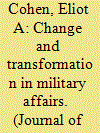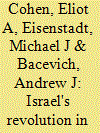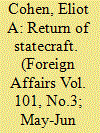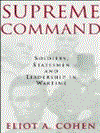| Srl | Item |
| 1 |
ID:
054688


|
|
|
| 2 |
ID:
065226


|
|
|
| 3 |
ID:
052334


|
|
|
|
|
| Publication |
Jul-Aug 2004.
|
| Summary/Abstract |
Whether or not the United States today should be called an empire is a semantic game. The important point is that it resembles previous empires enough to make the search for lessons of history worthwhile. Overwhelming dominance has always invited hostility. U.S. leaders thus must learn the arts of imperial management and diplomacy, exercising power with a bland smile rather than boastful words.
|
|
|
|
|
|
|
|
|
|
|
|
|
|
|
|
| 4 |
ID:
066445


|
|
|
| 5 |
ID:
065635


|
|
|
|
|
| Publication |
1998.
|
| Description |
p.48-67
|
|
|
|
|
|
|
|
|
|
|
|
|
|
|
|
| 6 |
ID:
186887


|
|
|
| 7 |
ID:
064557


|
|
|
| 8 |
ID:
135020


|
|
|
|
|
| Publication |
New York, Free Press, 2002.
|
| Description |
xiv, 288p.Hbk
|
| Contents |
B
|
| Standard Number |
0743230493
|
|
|
|
|
|
|
|
|
|
|
|
Copies: C:1/I:0,R:0,Q:0
Circulation
| Accession# | Call# | Current Location | Status | Policy | Location |
| 057952 | 322.5/COH 057952 | Main | On Shelf | General | |
|
|
|
|
| 9 |
ID:
135737


|
|
|
|
|
| Publication |
New York, Anchor Books, 2003.
|
| Description |
xiv, 304p.Pbk
|
| Standard Number |
1400034043
|
|
|
|
|
|
|
|
|
|
|
|
Copies: C:1/I:0,R:0,Q:0
Circulation
| Accession# | Call# | Current Location | Status | Policy | Location |
| 058076 | 322.5/COH 058076 | Main | On Shelf | General | |
|
|
|
|
| 10 |
ID:
142696


|
|
|
|
|
| Summary/Abstract |
The nuclear deal that the United States and five other great powers signed with Iran in July 2015 [1] is the final product of a decadelong effort at arms control. That effort included sanctions in an attempt to impede Iran’s quest for a nuclear weapons capability. The Joint Comprehensive Plan of Action , or JCPOA, ranks as one of the most deficient arms control agreements in history. But U.S. President Barack Obama has pledged to spend the remainder of his tenure fending off congressional pressures to adjust its terms
|
|
|
|
|
|
|
|
|
|
|
|
|
|
|
|
| 11 |
ID:
158851


|
|
|
|
|
| Summary/Abstract |
When Donald Trump became president of the United States [1], many wondered just how abnormal his administration, and particularly his foreign policy, would be. After all, as a candidate, Trump had evinced a partiality for foreign strongmen, derided U.S. allies as a gang of freeloaders, proposed banning Muslims from entering the United States, sneered at Mexicans, and denounced free-trade agreements such as the North American Free Trade Agreement and the nascent Trans-Pacific Partnership, while demonstrating little understanding of most other dimensions of international politics. Scores of former senior Republican foreign policy officials, myself included, repudiated his candidacy on the grounds of both his character and his bent toward populist isolationism. His inaugural address confirmed fears that he viewed the world in darkly narrow, zero-sum terms. “We’ve made other countries rich while the wealth, strength, and confidence of our country has dissipated over the horizon,” he said. He went on: “From this day forward, it’s going to be only America first [2]. America first.”
|
|
|
|
|
|
|
|
|
|
|
|
|
|
|
|